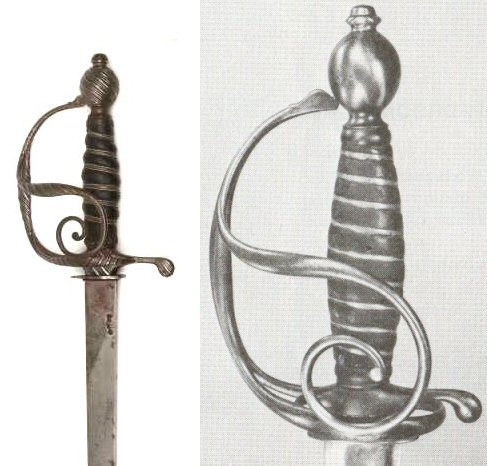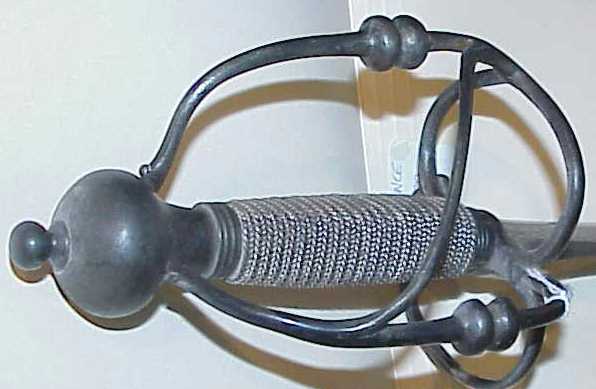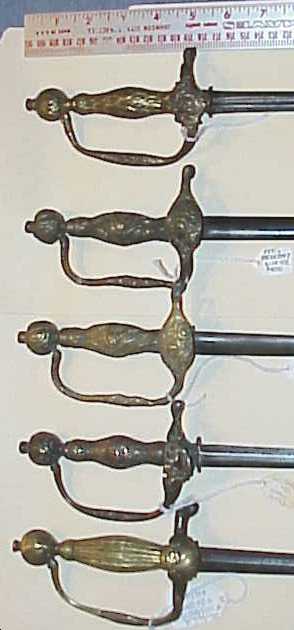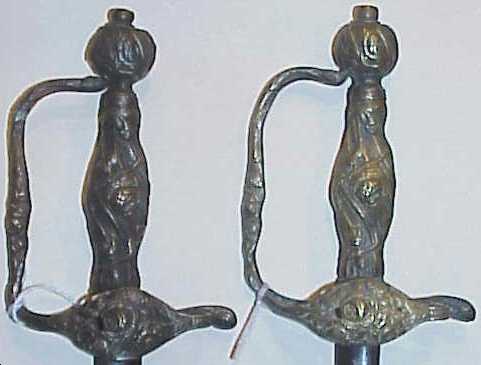| Author |
Message |
Stephen A. Fisher

Location: Kentucky USA Joined: 17 Oct 2003
Posts: 455
|
 Posted: Sat 10 Apr, 2004 5:02 pm Post subject: English loop-hilt spadroon c1770s ($17,500) Posted: Sat 10 Apr, 2004 5:02 pm Post subject: English loop-hilt spadroon c1770s ($17,500) |
 |
|
Hi all,
I hope that price tag caught your attention.  As some of you may know, I am a fan of the loop-hilted sword (A.V.B. Norman hilt type 109). This is one of my favorites. It's interesting to see where these things go. This fine loop-hilted spadroon first appeared on Michael D. Long's site last year. As some of you may know, I am a fan of the loop-hilted sword (A.V.B. Norman hilt type 109). This is one of my favorites. It's interesting to see where these things go. This fine loop-hilted spadroon first appeared on Michael D. Long's site last year.
They had it priced at $3,936.40.
(picture from Michael D. Long)
http://www.myArmoury.com/albums/photo/5365.html
Upon checking Fineswords.com today I came across this beauty once more to find some "fine" pictures with a not so "fine" price.
Michael D. Long price $3,936.40 -------- Fine Swords price $17,500 
"Charles Goze was a maker of fine swords in Metz, France from about 1770-1814. He well known for making exquisite officer’s swords and high quality Hussars sabers."......just ignore the rest of their embellished description.
circa 1770s
blade length-35 3/4”




Last edited by Stephen A. Fisher on Sat 10 Apr, 2004 5:11 pm; edited 2 times in total
|
|
   |
 |
Stephen A. Fisher

Location: Kentucky USA Joined: 17 Oct 2003
Posts: 455
|
 Posted: Sat 10 Apr, 2004 5:04 pm Post subject: Posted: Sat 10 Apr, 2004 5:04 pm Post subject: |
 |
|



|
|
   |
 |
Craig Johnson
Industry Professional

|
 Posted: Sat 10 Apr, 2004 7:18 pm Post subject: Posted: Sat 10 Apr, 2004 7:18 pm Post subject: |
 |
|
Great sword.
Price, well a guess we will see what the market will bear.
Interesting look at the antique sword market Stephen Thanks.
Best
Craig
|
|
    |
 |
Bill Grandy
myArmoury Team


|
 Posted: Sat 10 Apr, 2004 10:47 pm Post subject: Posted: Sat 10 Apr, 2004 10:47 pm Post subject: |
 |
|
That is one really sweet design! Maybe when I've got enough saved up for my next custom piece, I may think about an inspired by version... of course, that may be awhile. 
|
|
   |
 |
|
Scott Bubar
Location: New England Joined: 21 Aug 2003
Posts: 120
|
 Posted: Sun 11 Apr, 2004 7:39 am Post subject: Posted: Sun 11 Apr, 2004 7:39 am Post subject: |
 |
|
Oh well. I like a little more substance to a spadroon blade anyway. 
Thanks for tracking this one, Stephen.
|
|
  |
 |
Stephen A. Fisher

Location: Kentucky USA Joined: 17 Oct 2003
Posts: 455
|
 Posted: Mon 12 Apr, 2004 10:05 am Post subject: Posted: Mon 12 Apr, 2004 10:05 am Post subject: |
 |
|
Hi Craig,
Thanks, I always find it interesting when I see a particular sword come up somewhere else, it's interesting to watch how the pricing goes, who bought it, etc. I would expect that a company like Fineswords would raise the price considerably, and a $13,000+ price increase is a quite a jump.
Bill,
| Bill Grandy wrote: | That is one really sweet design! Maybe when I've got enough saved up for my next custom piece, I may think about an inspired by version... of course, that may be awhile.  |
I thought about that too, but as you know I already have two loop-hilt swords on order. So I'll let you have that one.  This spadroon is the most elaborate 18th century loop-hilt I've seen yet. And it offers almost total protection of the right side of your hand. This spadroon is the most elaborate 18th century loop-hilt I've seen yet. And it offers almost total protection of the right side of your hand.
Scott,
I agree, mount it with a blade a bit wider & add a fuller or two, and it would be perfect. 
 Attachment: 44.74 KB Attachment: 44.74 KB

2 spiral loop-hilt spadroons
|
|
   |
 |
Stephen A. Fisher

Location: Kentucky USA Joined: 17 Oct 2003
Posts: 455
|
 Posted: Mon 12 Apr, 2004 1:25 pm Post subject: Posted: Mon 12 Apr, 2004 1:25 pm Post subject: |
 |
|
The two loop-hilts in the attached picture (above) feature a bar which starts off at the knuckle bow and creates a spiral which is attached to the loop, allowing for some artistic display & added protection. From the examples I've seen, It seems that the idea of adding an additional branch from the knuckle bow was exclusive to the military loop-hilts of the 18th century.
more loop-hilted swords (currently 45 examples)
http://www.myArmoury.com/albums/thumbnails.php?album=107
|
|
   |
 |
|
John Piscopo
|
 Posted: Sun 18 Apr, 2004 7:49 am Post subject: Loop Hilt Sword Posted: Sun 18 Apr, 2004 7:49 am Post subject: Loop Hilt Sword |
 |
|
Dear Stephen,
Sorry for the delay in adding to your thread. I have followed the discussion but I had a lot of personal business to take care of, taxes, before I could take the time to focus on the topic.
The sword I would like to present is a Dutch Walloon, made under contract for use by the Dutch mercenaries in the service of the French Bourbon Monarchy from the time of Louis XIV. These swords replaced an earlier Walloon model that had two wide loops with shell guard inserts and fixed bar bows to provide a basket which would have housed a leather or felt insert:
 Attachment: 25.12 KB Attachment: 25.12 KB

I collect swords and bayonets dated WWI back to the Bronze Age from the US and Europe and ancient swords and other weapons from Eurasia. I participate in many historical forums for the study of ancient history and weapons. I am happy to share what expertise I have. John Piscopo
|
|
    |
 |
|
John Piscopo
|
 Posted: Sun 18 Apr, 2004 8:04 am Post subject: Loop Guard Walloon Sword Posted: Sun 18 Apr, 2004 8:04 am Post subject: Loop Guard Walloon Sword |
 |
|
The new sword model adopted by the mercenary regiments hired in the Netherlands for service with the various Louis XIV, XV and XVI were lighter in construction, had a movable bar guard that pivoted on a hinge and had a much less robust blade than the first Walloon swords. These swords can be documented in Jean Lhoste's Les Epees: Portees en France des Origines a Nos Jours. Editions du Portail, La Tour du Pin, France. 1997. Pages 128-129, Figures 208-211. It should be pointed out that Louis XIV hired mercenaries from Scotland, the Netherlands, Switzerland, Italian states and German states for service in his armies. This was before the Era of Nationalism where your national origin meant nothing and Monarchs would rule various states and prinipalities based upon their dynastic relationships rather than ethnic origins. There were no Nation States as we know of, the various large kingdoms, France, England, Spain, Austria, Turkey, Sweden and Russia all had polyglot states, all of these states had non-native citizens of their kingdoms. The English Monarchy was a German Hanoverian house, took the throne because the King of Hanover married a Stuart and when the the last Stuart died without an heir they needed a new king from the Dynasty. The new German king ruled as George I.
Here is a photo of the pages from Lhoste:
 Attachment: 39.52 KB Attachment: 39.52 KB
[ Download ]
I collect swords and bayonets dated WWI back to the Bronze Age from the US and Europe and ancient swords and other weapons from Eurasia. I participate in many historical forums for the study of ancient history and weapons. I am happy to share what expertise I have. John Piscopo
|
|
    |
 |
|
John Piscopo
|
 Posted: Sun 18 Apr, 2004 8:40 am Post subject: Walloon Loop Hilt Sword Posted: Sun 18 Apr, 2004 8:40 am Post subject: Walloon Loop Hilt Sword |
 |
|
My Dutch manufactured Walloon sword contains a wildly unique amount of information. It was manufactured in July of 1739 by Hendrik van Kouwenhoven, Master Swordsmith (Mr Swaardveger tot Utregt) Utrect. The Sun symbol on the Ricasso shows the iconography adopted by Louis XIV (1638-1715) who fancied himself as the Sun King and became a staple symbol of the Bourbon Dynasty. See Jean Lhoste's Armes Blanche: Symbolisme Insrciptions Marquages Fourbisseurs Manufactures. Editions du Portail. La Tour du Pin, France. 1994. Pages 10-12.
The blade itself is a thrusting weapon with a stiff 30.5" blade as opposed to the older model Walloon sword pictured above with a 33.5" blade. The older sword also had a much wider blade, 1.25" at the hilt, tapering to 1.165" at one inch as opposed to .75" at the distinct ricasso block. The older sowrd I am describing had its blade shortened by as much as 2.5", probably done with a modern restoration that replaced the wire grip with new braided silver wire and acid etched the blade to bring out the Damascus pattern.
The above shows a transition from the heavy broadswords to the lighter rapier swords, designed as thrusting weapons that would pierce leather after the abandonment of armor.
My sword has a brass hilt which only has traces of the original gold firegilding. It is also of an earlier date than the ones illustrated by Lhoste. The grip has two different types of wire wrap, one copper or brass and the other silver which is now black. The peening of the ball pommel is original and shows no sign of tampering. No modern cleaning of the sword.
I think I have provided ample evidence that besides the English, the Dutch and French manufactured and issued loop guard swords to their troops. Both of my Walloon swords are of Trooper grade, not likely to have been carried by officers.
 Attachment: 17.96 KB Attachment: 17.96 KB
[ Download ]
 Attachment: 32.62 KB Attachment: 32.62 KB
[ Download ]
 Attachment: 25.04 KB Attachment: 25.04 KB
[ Download ]
 Attachment: 14.53 KB Attachment: 14.53 KB
[ Download ]
I collect swords and bayonets dated WWI back to the Bronze Age from the US and Europe and ancient swords and other weapons from Eurasia. I participate in many historical forums for the study of ancient history and weapons. I am happy to share what expertise I have. John Piscopo
|
|
    |
 |
|
John Piscopo
|
 Posted: Sun 18 Apr, 2004 8:49 am Post subject: Walloon Swords Posted: Sun 18 Apr, 2004 8:49 am Post subject: Walloon Swords |
 |
|
I should make a note on pricing. I purchased my first Walloon sword, old model, in an eBay auction in August 1999 for $650. and my second one from Fred Coluzzi, a local dealer who publishes a catalog three times a year, for $900. Unfortunately, I did not note the date of purchase on the tag.
I have seen several Walloon swords on eBay since these purchases but the prices were higher than I wished to pay at the time. With the pictures above you should have a good idea what these swords look like. Look to see prices in the $1,000. to $1,500. range. These swords are not particularly rare, I purchased the only one of the Loop Guard swords I have ever seen with the movable pivoted bar.
I would welcome any comments on any of the above from anyone who would like to contribute. I am sure that Stephen will have something to say, anyone else have a Loop Guard? I will add a discussion of Loop Guard smallswords next.
I collect swords and bayonets dated WWI back to the Bronze Age from the US and Europe and ancient swords and other weapons from Eurasia. I participate in many historical forums for the study of ancient history and weapons. I am happy to share what expertise I have. John Piscopo
|
|
    |
 |
|
John Piscopo
|
 Posted: Sun 18 Apr, 2004 1:43 pm Post subject: Loop Guard Small Swords Posted: Sun 18 Apr, 2004 1:43 pm Post subject: Loop Guard Small Swords |
 |
|
Dear Friends,
There is a subset of Small Swords, which usually have shell guards, with loop guards. Unfortunately there is not a lot written about them. A.V.B. Norman's The Rapier and Small-Sword 1460-1820. Arms and Armour Press. London, UK.
1980. is the most extensive and reliable study of Smallswords but it shows only a few illustrations of them: Plates 75, 86 (Which also has a shell) and 96. None of these is the brass cast hilt shown in my examples below.
A good but less reliable source for these swords is Leslie Southwick's The Price Guide to Antique Edged Weapons. Antique Collectors' Club. Woodbridge Suffolk, UK. 1982. Page 91, figures 233 - 235 show different styles, but again no match with any of mine below.
With no good books illustrating these swords, I am forced to rely on inferences based on style. I date all of them to the 17th and early 18th Centuries and believe they originate from Spain, the Netherlands, Germany and Italy. One has the Passau running wolf on the blade.
The characteristics these swords share in common are cast brass hilts, knuckle bows and pommels with the typical smallsword style. The Loops have plates with various designs that face away from the blade. There are three hexanonal blades, one with a deep maker inscribed maker's name, and two are lens shaped. I have not seen any with the trefoil or triangular epee blades of the later models, nor do they have the pas d'ans of the more classical smallswords. They all have dark toning on the blade surfaces. I would assume from the age of these swords that they would all have Damascus patterns if they were cleaned, polished and acid etched, which I would never do.
The longest sword, at the top, has an overall length of 34.626" with a 29.25" blade. The center fuller is engraved with the name of the maker, SEBASTIAN ERNANEZ. This is a Spanish name (The ending -ez or es is typical of Spanish names originating from the Visigothic Kingdom. Ernanez = Hernandez = Hermannez). This sword was my most expensive purchase, $1134. with shipping from Cas d'Aste Czerny in Italy, purchased in their Dec. 1998 auction.
The shortest swords, a matched pair with the lens crosssection blades, have an overall length of 31.75" and a 26" blade (the last .25" is missing, the point has been rounded. I purchased it from Jan Zajak for $220. in 1999 and the other from Eftis Paraskevaides in a 2002 eBay auction.
The sword with the exaggerated bulge on the grip and the pierced block on the loop guard has an overall length of 32.5" and a 27.62" hexagonal blade etched with a vegetation motif. I believe the grip marks it as being German and the blade is more typical of those manufactured in Germany.
The last sword in this discussion has a much less ornate hilt, basically just lines incised into the wax used for the casting. It has an overall length of 32.375" and a 27.25" hexagonal blade with a knight carrying a shield and a sword over his head in an attack pose. This sword cost me $487.50 in an April 2000 eBay auction.
I do have brass hilted small swords with brass boat guards as part of brass hilts with brass knuckle bows, pommels and grips. Three of these blades are trefoil or triangular epees and three have a lens cross section. There are six swords in this group. Another has the traditional shell guard but a colichemerde blade. I would judge all of these swords to date from 1720-1760 in manufacture.
 Attachment: 21.75 KB Attachment: 21.75 KB

 Attachment: 17.08 KB Attachment: 17.08 KB

 Attachment: 46.97 KB Attachment: 46.97 KB
[ Download ]
 Attachment: 29.29 KB Attachment: 29.29 KB
[ Download ]
I collect swords and bayonets dated WWI back to the Bronze Age from the US and Europe and ancient swords and other weapons from Eurasia. I participate in many historical forums for the study of ancient history and weapons. I am happy to share what expertise I have. John Piscopo
|
|
    |
 |
Stephen A. Fisher

Location: Kentucky USA Joined: 17 Oct 2003
Posts: 455
|
 Posted: Sun 18 Apr, 2004 4:06 pm Post subject: Re: Walloon Swords Posted: Sun 18 Apr, 2004 4:06 pm Post subject: Re: Walloon Swords |
 |
|
Hello John,
excellent posts and thanks for sharing more of you fine collection with us.
| John Piscopo wrote: | | These swords are not particularly rare, I purchased the only one of the Loop Guard swords I have ever seen with the movable pivoted bar. |
In addition to your example. Here is another loop-hilt, containing a loop on both sides, that also features a pivoting knuckle guard. This one was from the latest Stockholms auction.
http://www.myArmoury.com/albums/photo/6095.html
(off the subject of loop-hilts, but still of interest is this smallsword which also features a pivoting knuckle guard, this one is from Peter Finer)
http://www.myArmoury.com/albums/photo/4680.html
|
|
   |
 |
Stephen A. Fisher

Location: Kentucky USA Joined: 17 Oct 2003
Posts: 455
|
 Posted: Sun 18 Apr, 2004 4:18 pm Post subject: Posted: Sun 18 Apr, 2004 4:18 pm Post subject: |
 |
|
|
What attracts me to the loop-hilt, aside from their appearance, is the many variations that the loop-hilt can be found in: broadswords, spadroons, 17th century transitional rapiers, 18th century smallswords, sabres & hangers. Off the top of my head, I can think of no other hilt form as diverse.
|
|
   |
 |
Stephen A. Fisher

Location: Kentucky USA Joined: 17 Oct 2003
Posts: 455
|
 Posted: Sun 18 Apr, 2004 4:59 pm Post subject: Posted: Sun 18 Apr, 2004 4:59 pm Post subject: |
 |
|
Loop-hilt Smallswords
It should also be noted that the brass hilted smallswords which John has illustrated above, almost always, the loop is a lot closer to the quillon block than what is commonly found on other loop-hilts. The grips with the swelling in the middle, very popular in Germany, can be found in porcelain, brass, etc. Another characteristic of these particular loop-hilt smallswords is the decorative design of the loop, which, rather than being a bar, is wide and flat with a swelling in the middle and often contained decoration in the forms of shells, piercings, etc.
more examples:
http://www.myArmoury.com/albums/photo/5352.html
http://www.myArmoury.com/albums/photo/5362.html
http://www.myArmoury.com/albums/photo/5344.html
http://www.myArmoury.com/albums/photo/5359.html
_______________________________________________________________
The loop-hilt smallsword & conventional hilt smallsword:
During the 17 & 18th century, the hilt of the loop-hilt smallsword was decorated according to the fashion of whatever was popular at the time.
See examples below-
Porcelain grips-
http://www.myArmoury.com/albums/photo/5625.html
Gadrooned hilts-
http://www.myArmoury.com/albums/photo/5551.html
Faceted pommels-
conventional hilts http://www.myArmoury.com/albums/photo/4685.html
http://www.myArmoury.com/albums/photo/4708.html
loop-hilts http://www.myArmoury.com/albums/photo/5134.html
http://www.myArmoury.com/albums/photo/6529.html
Last edited by Stephen A. Fisher on Tue 20 Apr, 2004 9:53 am; edited 1 time in total
|
|
   |
 |
|
John Piscopo
|
 Posted: Sun 18 Apr, 2004 5:18 pm Post subject: Loop Guard Swords Posted: Sun 18 Apr, 2004 5:18 pm Post subject: Loop Guard Swords |
 |
|
Dear Stephen,
Feel free to copy my photos into your Loop Guard album if you wish to do so. Take a look at the Hunting Sword threads I am posting.
I collect swords and bayonets dated WWI back to the Bronze Age from the US and Europe and ancient swords and other weapons from Eurasia. I participate in many historical forums for the study of ancient history and weapons. I am happy to share what expertise I have. John Piscopo
|
|
    |
 |
|
John Piscopo
|
 Posted: Mon 19 Apr, 2004 12:35 pm Post subject: Loop Guard Smallsword Posted: Mon 19 Apr, 2004 12:35 pm Post subject: Loop Guard Smallsword |
 |
|
Dear Friends,
I am in the process of going through the online catalog of Casa d'Aste Czerny and found a Loop Hilt Smallsword for sale. The sword is not inexpensive, the minimum bid is 650 euros, about $780., add another 25% for commissions and shipping and you have a thousand $ sword. http://www.czernys.com/frame-catalogo-12.html Click on the catalog cover, then go to spade, strisce, daghe (423 - 518) http://213.188.195.26/czernysasp/elenco_lotti...ria=SPADE, STRISCE, DAGHE&ris=10
The description, in Italian is:
Lotto/Item n. 0498
Spadino (Smallsword)
Europa, XVIII Sec.
da paggio, lama a sezione lenticolare appiattita al centro, decorata al forte con volute e tralci, fornimento in bronzo dorato, con piccolo arco di guardia lavorato come il pomo e l'impugnatura a torchon. Buone condizioni.
L. 86.5 cm.
650.00 / 850.00 €
I collect swords and bayonets dated WWI back to the Bronze Age from the US and Europe and ancient swords and other weapons from Eurasia. I participate in many historical forums for the study of ancient history and weapons. I am happy to share what expertise I have. John Piscopo
|
|
    |
 |
|
|
You cannot post new topics in this forum
You cannot reply to topics in this forum
You cannot edit your posts in this forum
You cannot delete your posts in this forum
You cannot vote in polls in this forum
You cannot attach files in this forum
You can download files in this forum
|
All contents © Copyright 2003-2026 myArmoury.com — All rights reserved
Discussion forums powered by phpBB © The phpBB Group
Switch to the Basic Low-bandwidth Version of the forum
|

